马丁路德金英文作文
马丁路得基介绍英语作文
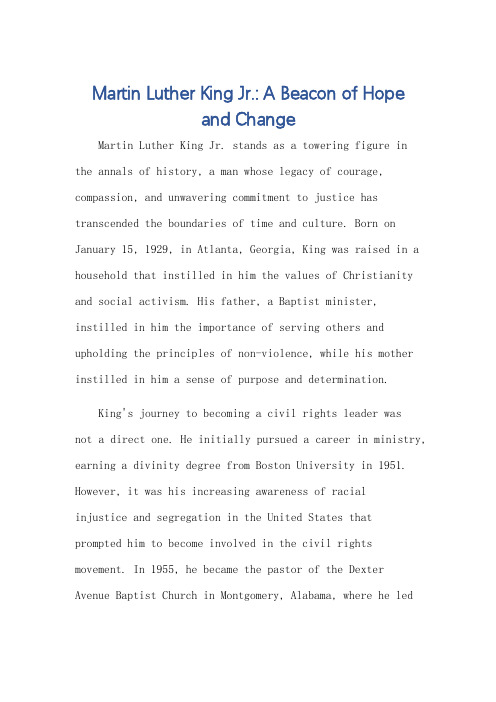
Martin Luther King Jr.: A Beacon of Hopeand ChangeMartin Luther King Jr. stands as a towering figure in the annals of history, a man whose legacy of courage, compassion, and unwavering commitment to justice has transcended the boundaries of time and culture. Born on January 15, 1929, in Atlanta, Georgia, King was raised in a household that instilled in him the values of Christianity and social activism. His father, a Baptist minister,instilled in him the importance of serving others and upholding the principles of non-violence, while his mother instilled in him a sense of purpose and determination.King's journey to becoming a civil rights leader wasnot a direct one. He initially pursued a career in ministry, earning a divinity degree from Boston University in 1951. However, it was his increasing awareness of racialinjustice and segregation in the United States that prompted him to become involved in the civil rights movement. In 1955, he became the pastor of the Dexter Avenue Baptist Church in Montgomery, Alabama, where he ledthe charge against the racist bus policies that had becomea symbol of segregation.King's most famous speech, "I Have a Dream," delivered on August 8, 1963, at the Lincoln Memorial in Washington, D.C., is a powerful testament to his vision of a racially harmonious society. His words, filled with hope and aspiration, resonated with millions across the globe and served as a rallying cry for the civil rights movement. His dreams of a nation where people would be judged not by the color of their skin but by the content of their character remain as relevant and important today as they were more than half a century ago.King's life was not without its challenges and setbacks. He faced constant threats, harassment, and even violencefor his unwavering commitment to justice. However, he never lost sight of his goal, and his resilience anddetermination in the face of adversity are a testament tohis unyielding spirit. Tragically, on April 4, 1968, King was assassinated while leading a strike in Memphis, Tennessee. His death sent shockwaves across the nation and the world, but his legacy of peace and justice lives on.Martin Luther King Jr.'s life and work have had a profound impact on society. His tireless efforts to end racial discrimination and segregation have helped to shape the United States into a more inclusive and equitable nation. His legacy serves as a reminder that everyindividual has the power to make a difference and that through peaceful protest and determined action, we canbring about change.Today, we honor Martin Luther King Jr. not only for his groundbreaking work in the civil rights movement but alsofor his unwavering commitment to peace, love, and justice. His life and words continue to inspire millions across the globe to fight for equality, justice, and the dignity ofall human beings. As we纪念马丁·路德·金日(Martin Luther King Jr. Day), we remember his words: "Darkness cannot drive out darkness; only light can do that. Hate cannotdrive out hate; only love can do that."**马丁·路德·金:希望与变革的灯塔**马丁·路德·金在历史长河中屹立不倒,他的勇敢、同情心和坚定不移的正义追求超越了时间和文化的界限。
马丁路德金 英语作文
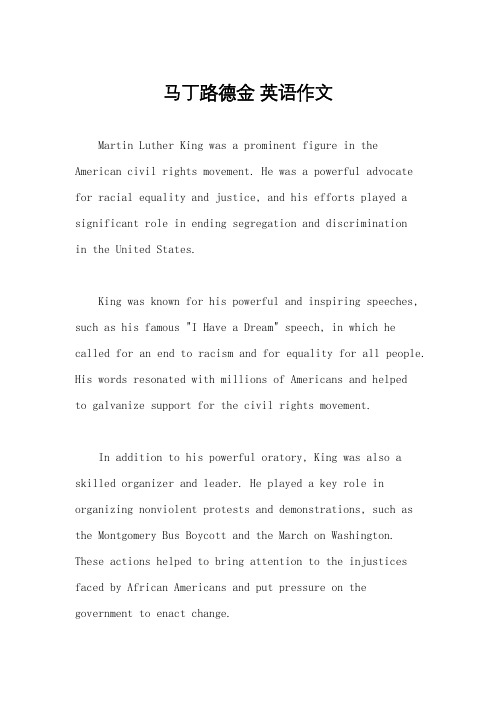
马丁路德金英语作文Martin Luther King was a prominent figure in the American civil rights movement. He was a powerful advocate for racial equality and justice, and his efforts played a significant role in ending segregation and discriminationin the United States.King was known for his powerful and inspiring speeches, such as his famous "I Have a Dream" speech, in which he called for an end to racism and for equality for all people. His words resonated with millions of Americans and helpedto galvanize support for the civil rights movement.In addition to his powerful oratory, King was also a skilled organizer and leader. He played a key role in organizing nonviolent protests and demonstrations, such as the Montgomery Bus Boycott and the March on Washington. These actions helped to bring attention to the injustices faced by African Americans and put pressure on the government to enact change.Despite facing significant opposition and even violence, King remained committed to his principles of nonviolenceand civil disobedience. He believed that through peaceful means, change could be achieved, and his steadfast dedication to this belief inspired countless others to join the fight for civil rights.Tragically, King's life was cut short when he was assassinated in 1968. However, his legacy lives on, and his impact on the civil rights movement continues to be felt to this day. His work and his words continue to inspire people around the world to fight for justice and equality, and his contributions to the cause of civil rights will never be forgotten.。
马丁路德金 英语作文
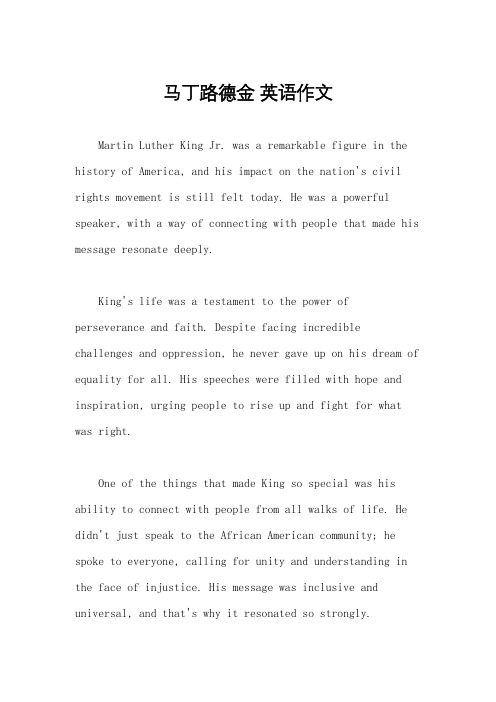
马丁路德金英语作文Martin Luther King Jr. was a remarkable figure in the history of America, and his impact on the nation's civil rights movement is still felt today. He was a powerful speaker, with a way of connecting with people that made his message resonate deeply.King's life was a testament to the power of perseverance and faith. Despite facing incredible challenges and oppression, he never gave up on his dream of equality for all. His speeches were filled with hope and inspiration, urging people to rise up and fight for what was right.One of the things that made King so special was his ability to connect with people from all walks of life. He didn't just speak to the African American community; he spoke to everyone, calling for unity and understanding in the face of injustice. His message was inclusive and universal, and that's why it resonated so strongly.King's legacy is not just about the past; it's also about the future. His work continues to inspire people today, calling them to action in the fight for equality。
马丁路德金英语作文
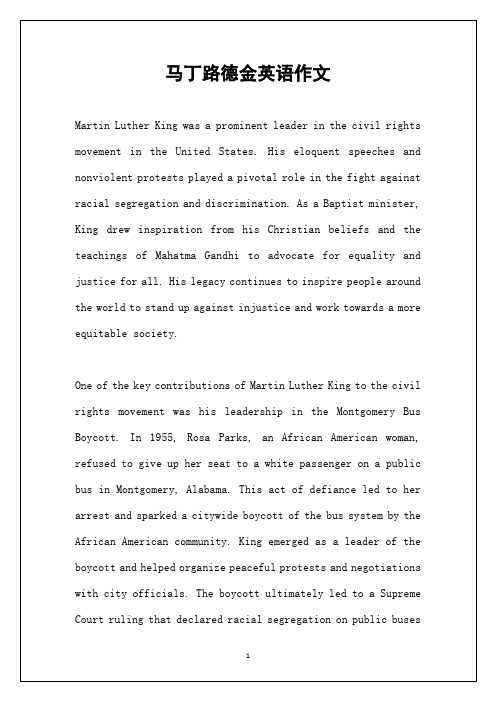
Tragically, Martin Luther King's life was cut short when he was assassinated in 1968. His untimely death was a devastating loss for the civil rights movement, but his legacy lived on in the hearts and minds of those who continued to fight for justice and equality. In 1983, the United States established Martin Luther King Jr. Day as a federal holiday to honor his contributions to the country. This recognition further solidified King's impact on American society and cemented his status as a champion of civil rights.
马丁路德金事迹英语作文简短
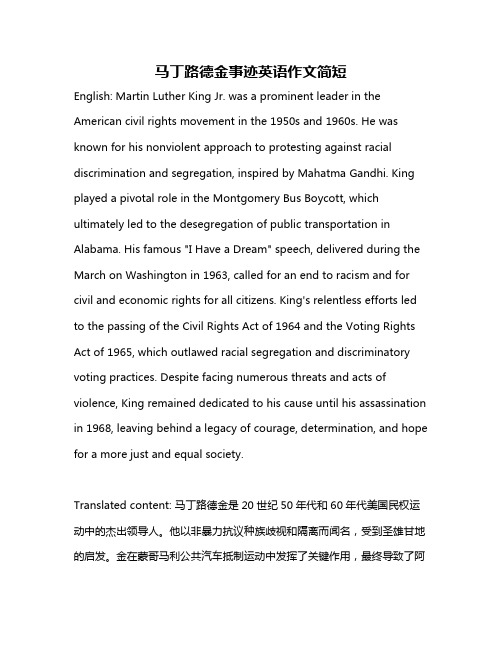
马丁路德金事迹英语作文简短English: Martin Luther King Jr. was a prominent leader in the American civil rights movement in the 1950s and 1960s. He was known for his nonviolent approach to protesting against racial discrimination and segregation, inspired by Mahatma Gandhi. King played a pivotal role in the Montgomery Bus Boycott, which ultimately led to the desegregation of public transportation in Alabama. His famous "I Have a Dream" speech, delivered during the March on Washington in 1963, called for an end to racism and for civil and economic rights for all citizens. King's relentless efforts led to the passing of the Civil Rights Act of 1964 and the Voting Rights Act of 1965, which outlawed racial segregation and discriminatory voting practices. Despite facing numerous threats and acts of violence, King remained dedicated to his cause until his assassination in 1968, leaving behind a legacy of courage, determination, and hope for a more just and equal society.Translated content: 马丁路德金是20世纪50年代和60年代美国民权运动中的杰出领导人。
马丁路德金 英语作文
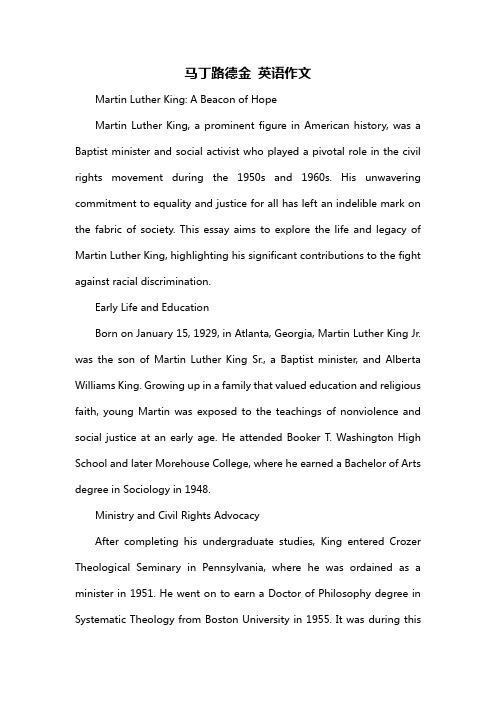
马丁路德金英语作文Martin Luther King: A Beacon of HopeMartin Luther King, a prominent figure in American history, was a Baptist minister and social activist who played a pivotal role in the civil rights movement during the 1950s and 1960s. His unwavering commitment to equality and justice for all has left an indelible mark on the fabric of society. This essay aims to explore the life and legacy of Martin Luther King, highlighting his significant contributions to the fight against racial discrimination.Early Life and EducationBorn on January 15, 1929, in Atlanta, Georgia, Martin Luther King Jr. was the son of Martin Luther King Sr., a Baptist minister, and Alberta Williams King. Growing up in a family that valued education and religious faith, young Martin was exposed to the teachings of nonviolence and social justice at an early age. He attended Booker T. Washington High School and later Morehouse College, where he earned a Bachelor of Arts degree in Sociology in 1948.Ministry and Civil Rights AdvocacyAfter completing his undergraduate studies, King entered Crozer Theological Seminary in Pennsylvania, where he was ordained as a minister in 1951. He went on to earn a Doctor of Philosophy degree in Systematic Theology from Boston University in 1955. It was during thistime that King became actively involved in the civil rights movement, drawing inspiration from Mahatma Gandhi's philosophy of nonviolent resistance.King's journey as a civil rights activist began in Montgomery, Alabama, where he led the Montgomery Bus Boycott in 1955-1956. This protest, sparked by Rosa Parks' refusal to give up her seat to a white passenger, resulted in a Supreme Court ruling that declared segregation on public buses unconstitutional.Leadership and AchievementsMartin Luther King's leadership and charismatic oratory skills propelled him to the forefront of the civil rights movement. In 1957, he co-founded the Southern Christian Leadership Conference (SCLC), an organization dedicated to nonviolent direct action against segregation and discrimination. Under King's guidance, the SCLC organized numerous protests, marches, and demonstrations across the United States.One of King's most famous speeches, \'I Have a Dream,\' was delivered during the historic March on Washington for Jobs and Freedom in 1963. This event, which attracted over 250,000 participants, is widely regarded as a turning point in the civil rights movement. King's powerful words continues to inspire people worldwide, emphasizing the importance of equality, justice, and unity.Throughout his activism, Martin Luther King faced numerouschallenges, including arrests and assassination attempts. However, he remained steadfast in his commitment to nonviolence and social change. His efforts contributed to significant legislative victories, such as the Civil Rights Act of 1964 and the Voting Rights Act of 1965.LegacyMartin Luther King's life was tragically cut short on April 4, 1968, when he was assassinated in Memphis, T ennessee. Despite his untimely death, his legacy lives on. The Martin Luther King Jr. National Historical Park in Atlanta, Georgia, stands as a testament to his life and achievements. Additionally, the United States observes Martin Luther King Jr. Day on the third Monday of January each year, celebrating his contributions to the fight for equality and justice.In conclusion, Martin Luther King was a remarkable leader who fought tirelessly for the rights of African Americans and the betterment of society. His philosophy of nonviolent resistance and his unwavering dedication to equality have left an enduring legacy that continues to inspire generations to come.。
马丁路德金 英语作文 我最崇拜的人
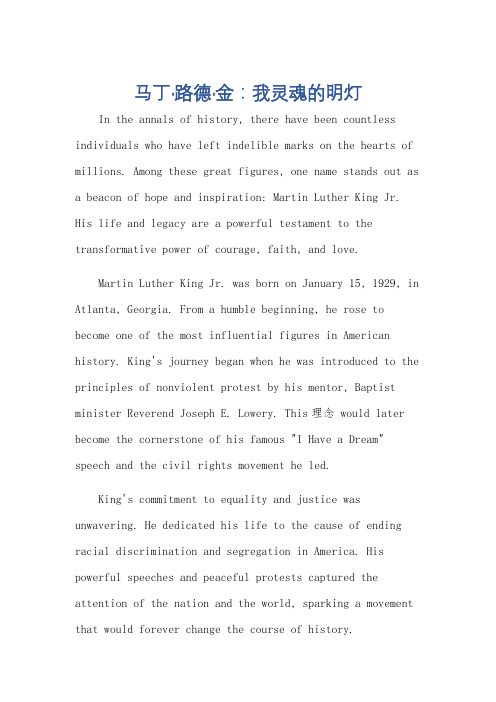
马丁·路德·金:我灵魂的明灯In the annals of history, there have been countless individuals who have left indelible marks on the hearts of millions. Among these great figures, one name stands out as a beacon of hope and inspiration: Martin Luther King Jr. His life and legacy are a powerful testament to the transformative power of courage, faith, and love.Martin Luther King Jr. was born on January 15, 1929, in Atlanta, Georgia. From a humble beginning, he rose to become one of the most influential figures in American history. King's journey began when he was introduced to the principles of nonviolent protest by his mentor, Baptist minister Reverend Joseph E. Lowery. This理念 would later become the cornerstone of his famous "I Have a Dream" speech and the civil rights movement he led.King's commitment to equality and justice was unwavering. He dedicated his life to the cause of ending racial discrimination and segregation in America. His powerful speeches and peaceful protests captured the attention of the nation and the world, sparking a movement that would forever change the course of history.One of King's most iconic moments was his speech at the Lincoln Memorial in Washington D.C. on August 8, 1963. In his "I Have a Dream" speech, King outlined his vision of a future where all people, regardless of race, would be treated with equality and dignity. His words were filled with passion and hope, inspiring countless individuals to action.King's legacy is not just limited to his activism and speeches. His commitment to nonviolent protest set a precedent for future movements around the world. His work also influenced the passage of the Civil Rights Act of 1964 and the Voting Rights Act of 1965, two landmark pieces of legislation that guaranteed equal rights and opportunities for African Americans.However, King's life was not without its challenges. He faced constant threats and danger for his activism, yet he never gave up. His unwavering faith in humanity and his belief in the power of love were the driving forces behind his courage and perseverance.Martin Luther King Jr.'s impact on society is immeasurable. His legacy has transcended time and culture,inspiring generations of individuals to fight for justice and equality. His life story is a powerful reminder of the transformative power of courage, faith, and love.As I reflect on the life and legacy of Martin Luther King Jr., I am reminded of the importance of holding onto our dreams and fighting for what we believe in. King's life was a testament to the fact that one individual, with unwavering faith and courage, can make a significant impact on the world. His legacy is a beacon of hope andinspiration for us all.**马丁·路德·金:我灵魂的明灯**在历史的长河中,无数个体在数百万人的心中留下了不可磨灭的印记。
马丁路德金事迹英语作文简短

马丁路德金事迹英语作文简短(中英文版)Martin Luther King Jr., a prominent civil rights activist, was a beacon of hope and equality in the20th century.Born on January 15, 1929, in Atlanta, Georgia, King became the leading voice against racial discrimination, employing nonviolent methods to advocate for social justice.His iconic "I Have a Dream" speech during the 1963 March on Washington resonates to this day, serving as a powerful reminder of the ongoing struggle for equality.马丁·路德·金,一位杰出的民权活动家,是20世纪希望的明灯和平等的倡导者。
1929年1月15日出生于佐治亚州的亚特兰大,金成为了反对种族歧视的领军人物,运用非暴力手段为社会正义而倡导。
他在1963年华盛顿大游行的著名演讲《我有一个梦想》至今仍回响在人们耳边,成为对平等持续斗争的强大警示。
Throughout his life, King faced numerous challenges and threats, yet he remained steadfast in his commitment to peaceful protest.His philosophy of nonviolence was deeply rooted in his Christian beliefs and the teachings of Mahatma Gandhi.King"s leadership and unwavering determination led to significant civil rights advancements, including the passage of the Civil Rights Act of 1964 and the Voting Rights Act of 1965.在他的一生中,金面临着无数的挑战和威胁,但他始终坚定地承诺和平抗议。
马丁路得基介绍英语作文

马丁路得基介绍英语作文English:Martin Luther King Jr. was an influential leader in the American civil rights movement. He was born on January 15, 1929, in Atlanta, Georgia. King was an advocate for nonviolent protest and played a key role in the Montgomery Bus Boycott, which eventually led to the desegregation of public transportation in the city. He also helped organize the March on Washington, where he delivered his famous "I Have a Dream" speech, calling for racial equality and an end to discrimination. King's efforts were instrumental in the passage of the Civil Rights Act of 1964 and the Voting Rights Act of 1965. He was awarded the Nobel Peace Prize in 1964 for his work in combating racial inequality. Unfortunately, King's life was cut short when he was assassinated on April 4, 1968, in Memphis, Tennessee. Despite his untimely death, his legacy and message continue to inspire people around the world to fight for justice and equality.Translated content:马丁路德金是美国民权运动中具有影响力的领袖。
为马丁路德金写一篇英文作文
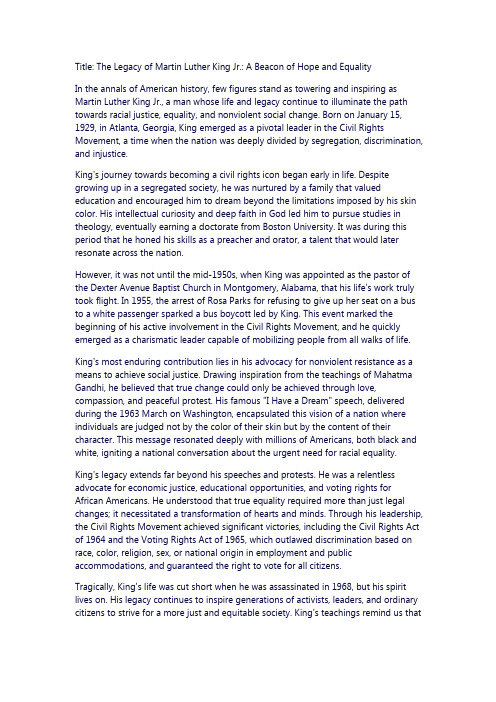
Title: The Legacy of Martin Luther King Jr.: A Beacon of Hope and EqualityIn the annals of American history, few figures stand as towering and inspiring as Martin Luther King Jr., a man whose life and legacy continue to illuminate the path towards racial justice, equality, and nonviolent social change. Born on January 15, 1929, in Atlanta, Georgia, King emerged as a pivotal leader in the Civil Rights Movement, a time when the nation was deeply divided by segregation, discrimination, and injustice.King's journey towards becoming a civil rights icon began early in life. Despite growing up in a segregated society, he was nurtured by a family that valued education and encouraged him to dream beyond the limitations imposed by his skin color. His intellectual curiosity and deep faith in God led him to pursue studies in theology, eventually earning a doctorate from Boston University. It was during this period that he honed his skills as a preacher and orator, a talent that would later resonate across the nation.However, it was not until the mid-1950s, when King was appointed as the pastor of the Dexter Avenue Baptist Church in Montgomery, Alabama, that his life's work truly took flight. In 1955, the arrest of Rosa Parks for refusing to give up her seat on a bus to a white passenger sparked a bus boycott led by King. This event marked the beginning of his active involvement in the Civil Rights Movement, and he quickly emerged as a charismatic leader capable of mobilizing people from all walks of life. King's most enduring contribution lies in his advocacy for nonviolent resistance as a means to achieve social justice. Drawing inspiration from the teachings of Mahatma Gandhi, he believed that true change could only be achieved through love, compassion, and peaceful protest. His famous "I Have a Dream" speech, delivered during the 1963 March on Washington, encapsulated this vision of a nation where individuals are judged not by the color of their skin but by the content of their character. This message resonated deeply with millions of Americans, both black and white, igniting a national conversation about the urgent need for racial equality. King's legacy extends far beyond his speeches and protests. He was a relentless advocate for economic justice, educational opportunities, and voting rights for African Americans. He understood that true equality required more than just legal changes; it necessitated a transformation of hearts and minds. Through his leadership, the Civil Rights Movement achieved significant victories, including the Civil Rights Act of 1964 and the Voting Rights Act of 1965, which outlawed discrimination based on race, color, religion, sex, or national origin in employment and public accommodations, and guaranteed the right to vote for all citizens.Tragically, King's life was cut short when he was assassinated in 1968, but his spirit lives on. His legacy continues to inspire generations of activists, leaders, and ordinary citizens to strive for a more just and equitable society. King's teachings remind us thatchange is possible, even in the face of seemingly insurmountable odds, and that the power of love and nonviolent resistance can transform hearts and nations.In conclusion, Martin Luther King Jr. stands as a testament to the transformative power of courage, conviction, and compassion. His life and legacy serve as a beacon of hope, reminding us that the struggle for equality and justice is never truly over, but that with perseverance and a commitment to nonviolent resistance, we can continue to move towards a brighter, more inclusive future.。
我最敬佩的人马丁路德金英语作文80字
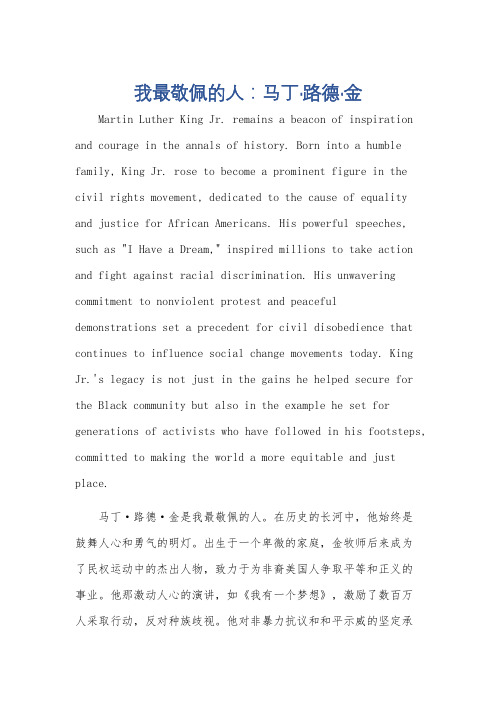
我最敬佩的人:马丁·路德·金Martin Luther King Jr. remains a beacon of inspiration and courage in the annals of history. Born into a humble family, King Jr. rose to become a prominent figure in the civil rights movement, dedicated to the cause of equality and justice for African Americans. His powerful speeches, such as "I Have a Dream," inspired millions to take action and fight against racial discrimination. His unwavering commitment to nonviolent protest and peaceful demonstrations set a precedent for civil disobedience that continues to influence social change movements today. King Jr.'s legacy is not just in the gains he helped secure for the Black community but also in the example he set for generations of activists who have followed in his footsteps, committed to making the world a more equitable and just place.马丁·路德·金是我最敬佩的人。
描写马丁路德金的我有一个梦想英语范文

描写马丁路德金的我有一个梦想英语范文全文共6篇示例,供读者参考篇1Once upon a time, there was a really awesome guy named Martin Luther King Jr. He had a super cool dream that he always talked about. It was a dream where everyone, no matter what color their skin was, could be friends and live in peace.Martin Luther King Jr. was a brave man who fought for what he believed in. He wanted to make the world a better place and end the unfair treatment of people just because of their skin color. He gave speeches and led protests to show that everyone should be treated with kindness and respect.His dream was so amazing because he wanted all the kids to play together, no matter what color they were. He didn't want anyone to feel left out or not accepted because of how they looked. He wanted us to all be buddies and live in harmony.Even though some people didn't agree with him, Martin Luther King Jr. never gave up on his dream. He kept on working hard and inspiring others to join him in making the world abetter place. And you know what? His dream started to come true!Today, because of Martin Luther King Jr.'s brave actions and inspiring words, we can all be friends and treat each other with love and respect. We can play and learn together without worrying about skin color. Isn't that just the best?So remember, just like Martin Luther King Jr., we can all have dreams and work hard to make them come true. Let's keep his dream alive and be kind to everyone, no matter what. Love and peace for all!篇2I have a dream, just like Martin Luther King! Martin Luther King was a very important person in history. He fought for equality and justice for all races in America. His most famous speech is "I have a dream", and it is still remembered today.Martin Luther King dreamed of a world where people of all races could live together in harmony. He believed that everyone should be treated equally, no matter what their skin color was. He wanted to end racism and make the world a better place for everyone.In his speech, Martin Luther King talked about his dream of a world where his four children would not be judged by the color of their skin, but by the content of their character. He believed that everyone should have the same opportunities and be able to achieve their dreams, no matter who they are.Martin Luther King's dream inspired many people to fight for civil rights and equality. He showed us that we can make a difference and change the world for the better. We should all remember his message of love, peace, and equality, and work towards making his dream a reality.So let's all remember Martin Luther King and his dream, and work together to make the world a better place for everyone. Let's spread love and kindness, and treat each other with respect and equality. Together, we can make a difference and create a world where everyone can live their dreams. Let's make Martin Luther King proud!篇3One day, there was a man named Martin Luther King Jr. He had a dream. He wanted everyone to be treated the same, no matter what color their skin was. This dream was called "I Have a Dream."In his dream, Martin Luther King Jr. saw a world where people of all colors could live together in peace. He dreamed of a world where everyone was judged by the content of their character, not by the color of their skin.He gave a famous speech about his dream in Washington, DC. He said, "I have a dream that my four little children will one day live in a nation where they will not be judged by the color of their skin but by the content of their character."Martin Luther King Jr. worked hard to make his dream come true. He led protests and marches to bring attention to the unfair treatment of black people in America. He believed that nonviolent protests were the key to achieving equality.Thanks to Martin Luther King Jr. and others who fought for civil rights, many laws were passed to end segregation and discrimination. His dream inspired people all over the world to stand up for justice and equality.Even though Martin Luther King Jr. is no longer with us, his dream lives on. His words continue to inspire us to work towards a world where everyone is treated with respect and dignity. Let's never forget his dream and keep working to make it a reality.篇4Once upon a time, there was a man named Martin Luther King Jr. He had a dream. A big dream. A dream of peace and equality for all people. He wanted everyone to be treated the same, no matter what color their skin was.Martin Luther King Jr. was a very brave man. He stood up for what he believed in, even when it was hard. He spoke out against unfair laws and discrimination. He gave powerful speeches, like his famous "I Have a Dream" speech.In his dream, Martin Luther King Jr. saw a world where people of all races could come together as equals. He believed in love and kindness, not hate and violence. He believed that we could all live in harmony, no matter our differences.Martin Luther King Jr. inspired many people with his words and actions. He showed them that they could make a difference, too. And because of him, the world is a better place today.So let's remember Martin Luther King Jr. and his dream of a better world. Let's be kind to each other and treat everyone with respect. Let's work together to make his dream a reality. And remember, no matter how small you may feel, you can always make a big difference, just like Martin Luther King Jr. did.篇5I have a dream! Do you know about Martin Luther King? He was a great man who fought for equality and peace. His famous speech "I have a dream" inspired millions of people around the world. Let me tell you about his dream.Martin Luther King dreamt that one day, all people would be treated equally, no matter what the color of their skin. He believed that everyone should be judged by the content of their character, not the color of their skin. He wanted to see a world where people could live together in harmony, without discrimination or prejudice.In his speech, he said, "I have a dream that one day this nation will rise up and live out the true meaning of its creed:‘We hold these truths to be self-evident, that all men are created equal.’" He dr eamt of a world where children of all races could play together, go to school together, and grow up to be friends.Martin Luther King's dream was not just for one country, but for the whole world. He believed that by working together and standing up for what is right, we can create a better future for everyone. His message of love, peace, and equality continues to inspire people today.So let's remember Martin Luther King and his dream. Let's work together to make his dream a reality. Let's treat each other with respect and kindness, and create a world where everyone can live in peace and harmony. I have a dream, just like Martin Luther King, and I believe that together, we can make it come true.篇6I have a dream! Do you know who said this famous line? It's Martin Luther King Jr.! He was a very special man who had a big dream for the world.Martin Luther King Jr. lived a long time ago in America. He wanted a world where everyone was treated equally, no matter what color their skin was. He didn't like how some people were treated badly just because of the color of their skin.One day, Martin Luther King Jr. stood up and said, "I have a dream that one day this nation will rise up and live out the true meaning of its creed: 'We hold these truths to be self-evident, that all men are created equal.'" He wanted everyone to be able to be friends and play together, no matter what they looked like.Martin Luther King Jr. gave a very famous speech called "I have a dream." In this speech, he talked about his dream of aworld where people were judged by their character, not by their skin color. He wanted everyone to be able to live in peace and harmony.Thanks to Martin Luther King Jr.'s hard work and dedication, many things have changed since then. People of all races can now go to the same schools, eat in the same restaurants, and even play on the same sports teams. His dream of equality and unity is still alive today.So, let's remember Martin Luther King Jr. and his dream. Let's work together to make the world a better place for everyone, just like he wanted. I have a dream, you have a dream, we all have a dream! Let's make them come true, just like Martin Luther King Jr. did.。
马丁路德金事迹的高一英语作文
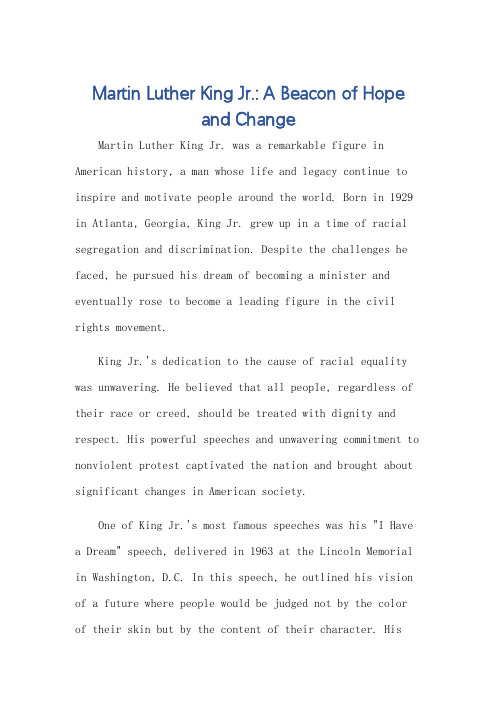
Martin Luther King Jr.: A Beacon of Hopeand ChangeMartin Luther King Jr. was a remarkable figure in American history, a man whose life and legacy continue to inspire and motivate people around the world. Born in 1929 in Atlanta, Georgia, King Jr. grew up in a time of racial segregation and discrimination. Despite the challenges he faced, he pursued his dream of becoming a minister and eventually rose to become a leading figure in the civil rights movement.King Jr.'s dedication to the cause of racial equality was unwavering. He believed that all people, regardless of their race or creed, should be treated with dignity and respect. His powerful speeches and unwavering commitment to nonviolent protest captivated the nation and brought about significant changes in American society.One of King Jr.'s most famous speeches was his "I Have a Dream" speech, delivered in 1963 at the Lincoln Memorial in Washington, D.C. In this speech, he outlined his vision of a future where people would be judged not by the color of their skin but by the content of their character. Hiswords were powerful and inspiring, and they resonated with people across the country who were tired of racialinjustice and inequality.King Jr.'s activism did not go unnoticed by the government. He and other civil rights leaders were frequently targets of hate and violence, but King Jr. always remained calm and composed. He knew that violence was not the way to bring about change and instead chose to focus on peace and love.In 1968, King Jr. was assassinated while giving a speech in Memphis, Tennessee. His death was a tragic loss for the civil rights movement and for the country at large, but his message and legacy continue to live on.Today, Martin Luther King Jr. is remembered as a hero of the civil rights movement and a beacon of hope for people around the world. His life and legacy teach us that change is possible, even in the face of seemingly insurmountable obstacles. His dedication to racial equality and nonviolent protest remains a powerful reminder of the importance of standing up for what is right, even when it is difficult or unpopular.King Jr.'s legacy is not just about racial equality; it is about the power of hope and change. His life reminds us that every individual has the potential to make a difference, and that when we come together in unity and peace, we can bring about positive change in our communities and beyond.**马丁·路德·金:希望与变革的灯塔**马丁·路德·金是美国历史上的一位杰出人物,他的一生和遗产继续激励着世界各地的人们。
马丁路德金的评价英语作文
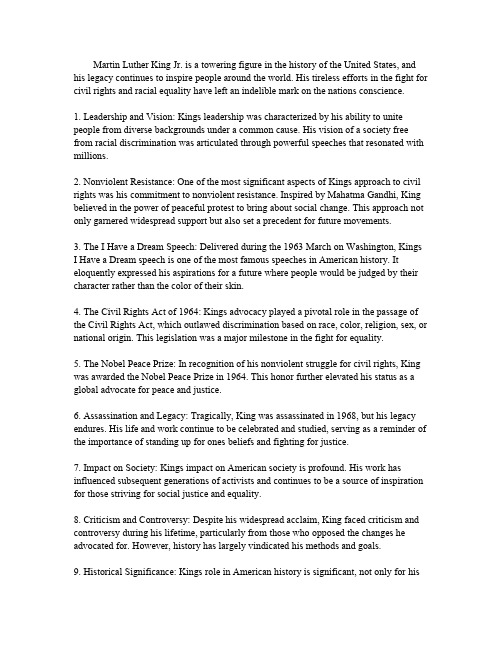
Martin Luther King Jr.is a towering figure in the history of the United States,and his legacy continues to inspire people around the world.His tireless efforts in the fight for civil rights and racial equality have left an indelible mark on the nations conscience.1.Leadership and Vision:Kings leadership was characterized by his ability to unite people from diverse backgrounds under a common cause.His vision of a society free from racial discrimination was articulated through powerful speeches that resonated with millions.2.Nonviolent Resistance:One of the most significant aspects of Kings approach to civil rights was his commitment to nonviolent resistance.Inspired by Mahatma Gandhi,King believed in the power of peaceful protest to bring about social change.This approach not only garnered widespread support but also set a precedent for future movements.3.The I Have a Dream Speech:Delivered during the1963March on Washington,KingsI Have a Dream speech is one of the most famous speeches in American history.It eloquently expressed his aspirations for a future where people would be judged by their character rather than the color of their skin.4.The Civil Rights Act of1964:Kings advocacy played a pivotal role in the passage of the Civil Rights Act,which outlawed discrimination based on race,color,religion,sex,or national origin.This legislation was a major milestone in the fight for equality.5.The Nobel Peace Prize:In recognition of his nonviolent struggle for civil rights,King was awarded the Nobel Peace Prize in1964.This honor further elevated his status as a global advocate for peace and justice.6.Assassination and Legacy:Tragically,King was assassinated in1968,but his legacy endures.His life and work continue to be celebrated and studied,serving as a reminder of the importance of standing up for ones beliefs and fighting for justice.7.Impact on Society:Kings impact on American society is profound.His work has influenced subsequent generations of activists and continues to be a source of inspiration for those striving for social justice and equality.8.Criticism and Controversy:Despite his widespread acclaim,King faced criticism and controversy during his lifetime,particularly from those who opposed the changes he advocated for.However,history has largely vindicated his methods and goals.9.Historical Significance:Kings role in American history is significant,not only for hiscontributions to the civil rights movement but also for his influence on the broader struggle for human rights worldwide.10.Personal Qualities:Kings personal qualities,such as his courage,resilience,and eloquence,have made him a revered figure.His ability to articulate complex ideas in a way that was accessible to all has contributed to his enduring appeal.In conclusion,Martin Luther King Jr.s life and work represent a beacon of hope and a call to action for all who believe in the principles of justice,equality,and peace.His legacy serves as a reminder of the power of individual action in shaping the course of history.。
马丁路德金英文作文
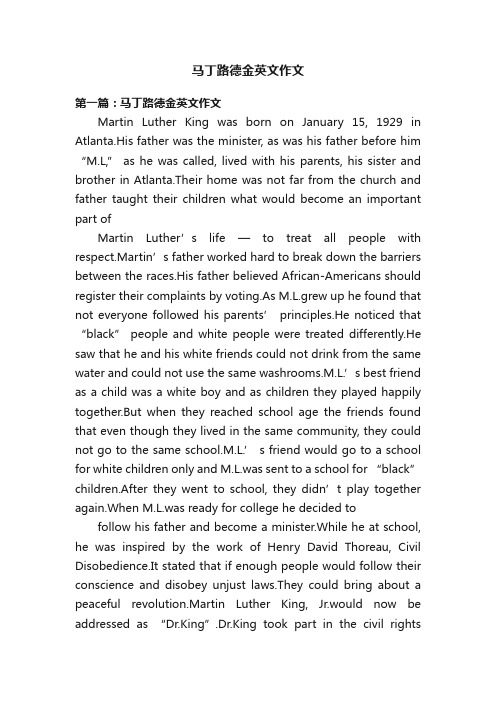
马丁路德金英文作文第一篇:马丁路德金英文作文Martin Luther King was born on January 15, 1929 in Atlanta.His father was the minister, as was his father before him “M.L,” as he was called, lived with his parents, his sister and brother in Atlanta.Their home was not far from the church and father taught their children what would become an important part ofMartin Luther’s life —to treat all people with respect.Martin’s father worked hard to break down the barriers between the races.His father believed African-Americans should register their complaints by voting.As M.L.grew up he found that not everyone followed his parents’ principles.He noticed that “black” people and white people were treated differently.He saw that he and his white friends could not drink from the same water and could not use the same washrooms.M.L.’s best friend as a child was a white boy and as children they played happily together.But when they reached school age the friends found that even though they lived in the same community, they could not go to the same school.M.L.’ s friend would go to a school for white children only and M.L.was sent to a school for “black” children.After they went to school, they didn’t play together again.When M.L.was ready for college he decided to follow his father and become a minister.While he at school, he was inspired by the work of Henry David Thoreau, Civil Disobedience.It stated that if enough people would follow their conscience and disobey unjust laws.They could bring about a peaceful revolution.Martin Luther King, Jr.would now be addressed as “Dr.King”.Dr.King took part in the civil rightsmovement began with the arrest of Mrs.Rosa Parks, was arrested for not giving a white bus rider her seat, Mrs.Parks was not the first African-American to be arrested for this “crime”, but she was well known in the African-American community.Dr.King and the other African-American leaders felt a protest was needed.The African-Americans of the city were asked to boycott the bus company by walking and driving instead.The United States Supreme Court would end the boycott, which lasted 381 days, by declaring that Alabama’s state and segregation on buses were illegal.The boycott was a success and Dr.King had showed that peaceful mass action could bring about change.In April 1968 Dr.King went to Tennessee to help the workers who were on strike.On April 3rd Dr.King would give what would be his last speech: “We’ve got some difficult days ahead.But it doesn’t matter with me now.Because I have been to the mountaintop.And I don’t mind.Like anybody, I would like to live a long life.Longevity has its place.But I’m not concerned about thatnow.I just want to do God’s will.And He’s allowed me to go up to the mountain.And I’ve looked over.And I’ve seen the Promised Land.I may not get there with you.But I want you to know tonight, that we, as a people will get to the Promised Land.And I’m not fearing any man.My eyes have seen the glory of the coming of the Lord”.The following day, April 4, 1968, as he was leaving hotel.Dr.Martin Luther King was shot and killed.1929,1,15th, Martin was born in Atlanta Geogia.1948, he graduated from Morehouse with a bachelor degree in sociology.1951, he graduated with a bachelor of divinity degree.1954, he became a pastor.1955, he graduated with a doctor of Philosophy degree at Boston Uni.1963, his efforts ledto March on Washington, where King delivered his “I have a dream” speech.1964, he became the youngest person to receive the Nobel Peace Prize.Then, he refocused his efforts on ending poverty and stopping the Vietnam War.1968,4,King was assassinated in Tennessee.第二篇:马丁路德金I Have a Dream 马丁路德金我有一个梦想(中英对照)by Martin Luther King, Jr.马丁路德金I am happy to join with you today in what will go down in history as the greatest demonstration for freedom in the history of our nation.今天,我高兴地同大家一起,参加这次将成为我国历史上为了争取自由而举行的最伟大的示威集会。
马丁路德金演讲稿中英文版
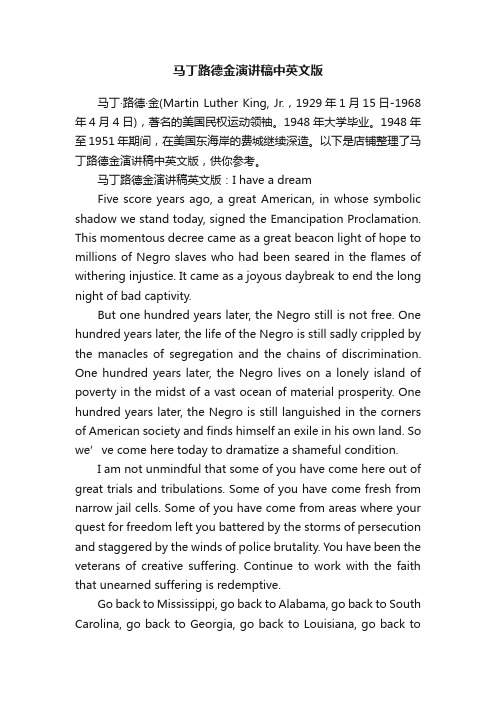
马丁路德金演讲稿中英文版马丁·路德·金(Martin Luther King, Jr.,1929年1月15日-1968年4月4日),著名的美国民权运动领袖。
1948年大学毕业。
1948年至1951年期间,在美国东海岸的费城继续深造。
以下是店铺整理了马丁路德金演讲稿中英文版,供你参考。
马丁路德金演讲稿英文版:I have a dreamFive score years ago, a great American, in whose symbolic shadow we stand today, signed the Emancipation Proclamation. This momentous decree came as a great beacon light of hope to millions of Negro slaves who had been seared in the flames of withering injustice. It came as a joyous daybreak to end the long night of bad captivity.But one hundred years later, the Negro still is not free. One hundred years later, the life of the Negro is still sadly crippled by the manacles of segregation and the chains of discrimination. One hundred years later, the Negro lives on a lonely island of poverty in the midst of a vast ocean of material prosperity. One hundred years later, the Negro is still languished in the corners of American society and finds himself an exile in his own land. So we’ve come here today to dramatize a shameful condition.I am not unmindful that some of you have come here out of great trials and tribulations. Some of you have come fresh from narrow jail cells. Some of you have come from areas where your quest for freedom left you battered by the storms of persecution and staggered by the winds of police brutality. You have been the veterans of creative suffering. Continue to work with the faith that unearned suffering is redemptive.Go back to Mississippi, go back to Alabama, go back to South Carolina, go back to Georgia, go back to Louisiana, go back tothe slums and ghettos of our northern cities, knowing that somehow this situation can and will be changed. Let us not wallow in the valley of despair.I say to you today, my friends, so even though we face the difficulties of today and tomorrow, I still have a dream. It is a dream deeply rooted in the American dream.I have a dream that one day this nation will rise up, live up to the true meaning of its creed: “We hold these truths to be self-evident; that all men are created equal.”I have a dream that one day on the red hills of Georgia the sons of former slaves and the sons of former slave-owners will be able to sit down together at the table of brotherhood.I have a dream that one day even the state of Mississippi, a state sweltering with the heat of injustice, sweltering with the heat of oppression, will be transformed into an oasis of freedom and justice.I have a dream that my four children will one day live in a nation where they will not be judged by the color if their skin but by the content of their character.I have a dream today.I have a dream that one day down in Alabama with its governor having his lips dripping with the words of interposition and nullification, one day right down in Alabama little black boys and black girls will be able to join hands with little white boys and white girls as sisters and brothers.I have a dream today.I have a dream that one day every valley shall be exalted, every hill and mountain shall be made low, the rough places will be made plain, and the crooked places will be made straight, and the glory of the Lord shall be revealed, and all flesh shall see ittogether.This is our hope. This is the faith that I go back to the South with. With this faith we will be able to hew out of the mountain of despair a stone of hope. With this faith we will be able to transform the jangling discords of our nation into a beautiful symphony of brotherhood. With this faith we will be able to work together, to pray together, to struggle together, to go to jail together, to stand up for freedom together, knowing that we will be free one day.This will be the day when all of God’s children will be able to sing with new meaning.My country, ’ tis of thee,Sweet land of liberty,Of thee I sing:Land where my fathers died,Land of the pilgrims’ pride,From every mountainsideLet freedom ring.And if America is to be a great nation this must become true. So let freedom ring from the prodigious hilltops of New Hampshire.Let freedom ring from the mighty mountains of New York!Let freedom ring from the heightening Alleghenies of Pennsylvania!Let freedom ring from the snowcapped Rockies of Colorado!Let freedom ring from the curvaceous slops of California!But not only that; let freedom ring from Stone Mountain of Georgia!Let freedom ring from Lookout Mountain of Tennessee!Let freedom ring from every hill and molehill of Mississippi!From every mountainside, let freedom ring!When we let freedom ring, when we let it ring from every village and every hamlet, from every state and every city, we will be able to speed up that day when all of God’s children, black men and white men, Jews and Gentiles, Protestants and Catholics, will be able to join hands and sing in the words of the old Negro spiritual, “Free at last! free at last! thank God almighty, we are free at last!”马丁路德金演讲稿中文版:我有一个梦想一百年前,一位伟大的美国人签署了解放黑奴宣言,今天我们就是在他的雕像前集会。
马丁路德金生平英语作文

马丁路德金生平英语作文Martin Luther King Jr. was a prominent civil rights leader in the United States. He was born on January 15,1929 in Atlanta, Georgia. King was known for his nonviolent approach to fighting for racial equality and justice.Growing up, King was influenced by his father, who wasa Baptist minister. He excelled in school and went on to study theology at Boston University. King became a pastor and used his position to advocate for social change.In 1955, King led the Montgomery Bus Boycott in Alabama, which was a pivotal moment in the civil rights movement. He went on to organize many peaceful protests and marches, including the famous March on Washington in 1963.King's famous "I Have a Dream" speech, delivered during the March on Washington, is still remembered today for its powerful message of hope and unity. He was awarded theNobel Peace Prize in 1964 for his work in advancing civilrights.Tragically, King was assassinated on April 4, 1968 in Memphis, Tennessee. His death was a great loss to the civil rights movement, but his legacy lives on in the continued fight for equality and justice.。
马丁·路德·金英文演讲:我已达至峰顶

马丁·路德·金英文演讲:我已达至峰顶马丁·路德·金是著名的美国民权运动领袖,今天给大家分享一篇马丁路德金在临死前一天的精彩演讲,希望对大家有所帮助。
马丁·路德·金英文演讲:我已达至峰顶Thank you very kindly, my friends. As I listened to Ralph Abernathy and his eloquent and generous introduction and then thought about myself, I wondered who he was talking about. It's always good to have your closest friend and associate to say something good about you. And Ralph Abernathy is the best friend that I have in the world. I'm delighted to see each of you here tonight in spite of a storm warning. You reveal that you are determined to go on anyhow.Something is happening in Memphis; something is happening in our world. And you know, if I were standing at the beginning of time, with the possibility of taking a kind of general and panoramic view of the whole of human history up to now, and the Almighty said to me, "Martin Luther King, which age would you like to live in?" I would take my mental flight by Egypt and I would watch God's children in their magnificent trek from the dark dungeons of Egypt through, or rather across the Red Sea, through the wilderness on toward the promised land. And in spite of its magnificence, I wouldn't stop there.I would move on by Greece and take my mind to Mount Olympus. And I would see Plato, Aristotle, Socrates, Euripides and Aristophanesassembled around the Parthenon. And I would watch them around the Parthenon as they discussed the great and eternal issues of reality. But I wouldn't stop there.I would go on, even to the great heyday of the Roman Empire. And I would see developments around there, through various emperors and leaders. But I wouldn't stop there.I would even come up to the day of the Renaissance, and get a quick picture of all that the Renaissance did for the cultural and aesthetic life of man. But I wouldn't stop there.I would even go by the way that the man for whom I am named had his habitat. And I would watch Martin Luther as he tacked his ninety-five theses on the door at the church of Wittenberg. But I wouldn't stop there.I would come on up even to 1863, and watch a vacillating President by the name of Abraham Lincoln finally come to the conclusion that he had to sign the Emancipation Proclamation. But I wouldn't stop there.I would even come up to the early thirties, and see a man grappling with the problems of the bankruptcy of his nation. And come with an eloquent cry that we have nothing to fear but "fear itself." But I wouldn't stop there.Strangely enough, I would turn to the Almighty, and say, "If you allow me to live just a few years in the second half of the 20th century, Iwill be happy."Now that's a strange statement to make, because the world is all messed up. The nation is sick. Trouble is in the land; confusion all around. That's a strange statement. But I know, somehow, that only when it is dark enough can you see the stars. And I see God working in this period of the twentieth century in a way that men, in some strange way, are responding.Something is happening in our world. The masses of people are rising up. And wherever they are assembled today, whether they are in Johannesburg, South Africa; Nairobi, Kenya; Accra, Ghana; New York City; Atlanta, Georgia; Jackson, Mississippi; or Memphis, Tennessee -- the cry is always the same: "We want to be free."And another reason that I'm happy to live in this period is that we have been forced to a point where we are going to have to grapple with the problems that men have been trying to grapple with through history, but the demands didn't force them to do it. Survival demands that we grapple with them. Men, for years now, have been talking about war and peace. But now, no longer can they just talk about it. It is no longer a choice between violence and nonviolence in this world; it's nonviolence or nonexistence. That is where we are today.And also in the human rights revolution, if something isn't done, and done in a hurry, to bring the colored peoples of the world out oftheir long years of poverty, their long years of hurt and neglect, the whole world is doomed. Now, I'm just happy that God has allowed me to live in this period to see what is unfolding. And I'm happy that He's allowed me to be in Memphis.I can remember -- I can remember when Negroes were just going around as Ralph has said, so often, scratching where they didn't itch, and laughing when they were not tickled. But that day is all over. We mean business now, and we are determined to gain our rightful place in God's world.And that's all this whole thing is about. We aren't engaged in any negative protest and in any negative arguments with anybody. We are saying that we are determined to be men. We are determined to be people. We are saying -- We are saying that we are God's children. And that we are God's children, we don't have to live like we are forced to live.Now, what does all of this mean in this great period of history? It means that we've got to stay together. We've got to stay together and maintain unity. You know, whenever Pharaoh wanted to prolong the period of slavery in Egypt, he had a favorite, favorite formula for doing it. What was that? He kept the slaves fighting among themselves. But whenever the slaves get together, something happens in Pharaoh's court, and he cannot hold the slaves in slavery. When the slaves get together,that's the beginning of getting out of slavery. Now let us maintain unity.Secondly, let us keep the issues where they are. The issue is injustice. The issue is the refusal of Memphis to be fair and honest in its dealings with its public servants, who happen to be sanitation workers. Now, we've got to keep attention on that. That's always the problem with a little violence. You know what happened the other day, and the press dealt only with the window-breaking. I read the articles. They very seldom got around to mentioning the fact that one thousand, three hundred sanitation workers are on strike, and that Memphis is not being fair to them, and that Mayor Loeb is in dire need of a doctor. They didn't get around to that.Now we're going to march again, and we've got to march again, in order to put the issue where it is supposed to be -- and force everybody to see that there are thirteen hundred of God's children here suffering, sometimes going hungry, going through dark and dreary nights wondering how this thing is going to come out. That's the issue. And we've got to say to the nation: We know how it's coming out. For when people get caught up with that which is right and they are willing to sacrifice for it, there is no stopping point short of victory.We aren't going to let any mace stop us. We are masters in our nonviolent movement in disarming police forces; they don't know what to do. I've seen them so often. I remember in Birmingham, Alabama,when we were in that majestic struggle there, we would move out of the 16th Street Baptist Church day after day; by the hundreds we would move out. And Bull Connor would tell them to send the dogs forth, and they did come; but we just went before the dogs singing, "Ain't gonna let nobody turn me around."Bull Connor next would say, "Turn the fire hoses on." And as I said to you the other night, Bull Connor didn't know history. He knew a kind of physics that somehow didn't relate to the transphysics that we knew about. And that was the fact that there was a certain kind of fire that no water could put out. And we went before the fire hoses; we had known water. If we were Baptist or some other denominations, we had been immersed. If we were Methodist, and some others, we had been sprinkled, but we knew water. That couldn't stop us.And we just went on before the dogs and we would look at them; and we'd go on before the water hoses and we would look at it, and we'd just go on singing "Over my head I see freedom in the air." And then we would be thrown in the paddy wagons, and sometimes we were stacked in there like sardines in a can. And they would throw us in, and old Bull would say, "Take 'em off," and they did; and we would just go in the paddy wagon singing, "We Shall Overcome." And every now and then we'd get in jail, and we'd see the jailers looking through the windows being moved by our prayers, and being moved by our words and oursongs. And there was a power there which Bull Connor couldn't adjust to; and so we ended up transforming Bull into a steer, and we won our struggle in Birmingham. Now we've got to go on in Memphis just like that. I call upon you to be with us when we go out Monday.Now about injunctions: We have an injunction and we're going into court tomorrow morning to fight this illegal, unconstitutional injunction. All we say to America is, "Be true to what you said on paper." If I lived in China or even Russia, or any totalitarian country, maybe I could understand some of these illegal injunctions. Maybe I could understand the denial of certain basic First Amendment privileges, because they hadn't committed themselves to that over there. But somewhere I read of the freedom of assembly. Somewhere I read of the freedom of speech. Somewhere I read of the freedom of press. Somewhere I read that the greatness of America is the right to protest for right. And so just as I say, we aren't going to let dogs or water hoses turn us around, we aren't going to let any injunction turn us around. We are going on.We need all of you. And you know what's beautiful to me is to see all of these ministers of the Gospel. It's a marvelous picture. Who is it that is supposed to articulate the longings and aspirations of the people more than the preacher? Somehow the preacher must have a kind of fire shut up in his bones. And whenever injustice is around he tell it. Somehow the preacher must be an Amos, and saith, "When God speakswho can but prophesy?" Again with Amos, "Let justice roll down like waters and righteousness like a mighty stream." Somehow the preacher must say with Jesus, "The Spirit of the Lord is upon me, because he hath anointed me," and he's anointed me to deal with the problems of the poor."And I want to commend the preachers, under the leadership of these noble men: James Lawson, one who has been in this struggle for many years; he's been to jail for struggling; he's been kicked out of Vanderbilt University for this struggle, but he's still going on, fighting for the rights of his people. Reverend Ralph Jackson, Billy Kiles; I could just go right on down the list, but time will not permit. But I want to thank all of them. And I want you to thank them, because so often, preachers aren't concerned about anything but themselves. And I'm always happy to see a relevant ministry.It's all right to talk about "long white robes over yonder," in all of its symbolism. But ultimately people want some suits and dresses and shoes to wear down here! It's all right to talk about "streets flowing with milk and honey," but God has commanded us to be concerned about the slums down here, and his children who can't eat three square meals a day. It's all right to talk about the new Jerusalem, but one day, God's preacher must talk about the new New York, the new Atlanta, the new Philadelphia, the new Los Angeles, the new Memphis, Tennessee. This iswhat we have to do.Now the other thing we'll have to do is this: Always anchor our external direct action with the power of economic withdrawal. Now, we are poor people. Individually, we are poor when you compare us with white society in America. We are poor. Never stop and forget that collectively -- that means all of us together -- collectively we are richer than all the nations in the world, with the exception of nine. Did you ever think about that? After you leave the United States, Soviet Russia, Great Britain, West Germany, France, and I could name the others, the American Negro collectively is richer than most nations of the world. We have an annual income of more than thirty billion dollars a year, which is more than all of the exports of the United States, and more than the national budget of Canada. Did you know that? That's power right there, if we know how to pool it.We don't have to argue with anybody. We don't have to curse and go around acting bad with our words. We don't need any bricks and bottles. We don't need any Molotov cocktails. We just need to go around to these stores, and to these massive industries in our country, and say, "God sent us by here, to say to you that you're not treating his children right. And we've come by here to ask you to make the first item on your agenda fair treatment, where God's children are concerned. Now, if you are not prepared to do that, we do have an agenda that we must follow.And our agenda calls for withdrawing economic support from you."And so, as a result of this, we are asking you tonight, to go out and tell your neighbors not to buy Coca-Cola in Memphis. Go by and tell them not to buy Sealtest milk. Tell them not to buy -- what is the other bread? -- Wonder Bread. And what is the other bread company, Jesse? Tell them not to buy Hart's bread. As Jesse Jackson has said, up to now, only the garbage men have been feeling pain; now we must kind of redistribute the pain. We are choosing these companies because they haven't been fair in their hiring policies; and we are choosing them because they can begin the process of saying they are going to support the needs and the rights of these men who are on strike. And then they can move on town -- downtown and tell Mayor Loeb to do what is right.But not only that, we've got to strengthen black institutions. I call upon you to take your money out of the banks downtown and deposit your money in Tri-State Bank. We want a "bank-in" movement in Memphis. Go by the savings and loan association. I'm not asking you something that we don't do ourselves at SCLC. Judge Hooks and others will tell you that we have an account here in the savings and loan association from the Southern Christian Leadership Conference. We are telling you to follow what we are doing. Put your money there. You have six or seven black insurance companies here in the city of Memphis. Take out your insurance there. We want to have an "insurance-in."Now these are some practical things that we can do. We begin the process of building a greater economic base. And at the same time, we are putting pressure where it really hurts. I ask you to follow through here.Now, let me say as I move to my conclusion that we've got to give ourselves to this struggle until the end. Nothing would be more tragic than to stop at this point in Memphis. We've got to see it through. And when we have our march, you need to be there. If it means leaving work, if it means leaving school -- be there. Be concerned about your brother. You may not be on strike. But either we go up together, or we go down together.Let us develop a kind of dangerous unselfishness. One day a man came to Jesus, and he wanted to raise some questions about some vital matters of life. At points he wanted to trick Jesus, and show him that he knew a little more than Jesus knew and throw him off base....Now that question could have easily ended up in a philosophical and theological debate. But Jesus immediately pulled that question from mid-air, and placed it on a dangerous curve between Jerusalem and Jericho. And he talked about a certain man, who fell among thieves. You remember that a Levite and a priest passed by on the other side. They didn't stop to help him. And finally a man of another race came by. He got down from his beast, decided not to be compassionate by proxy. Buthe got down with him, administered first aid, and helped the man in need. Jesus ended up saying, this was the good man, this was the great man, because he had the capacity to project the "I" into the "thou," and to be concerned about his brother.Now you know, we use our imagination a great deal to try to determine why the priest and the Levite didn't stop. At times we say they were busy going to a church meeting, an ecclesiastical gathering, and they had to get on down to Jerusalem so they wouldn't be late for their meeting. At other times we would speculate that there was a religious law that "One who was engaged in religious ceremonials was not to touch a human body twenty-four hours before the ceremony." And every now and then we begin to wonder whether maybe they were not going down to Jerusalem -- or down to Jericho, rather to organize a "Jericho Road Improvement Association." That's a possibility. Maybe they felt that it was better to deal with the problem from the causal root, rather than to get bogged down with an individual effect.But I'm going to tell you what my imagination tells me. It's possible that those men were afraid. You see, the Jericho road is a dangerous road. I remember when Mrs. King and I were first in Jerusalem. We rented a car and drove from Jerusalem down to Jericho. And as soon as we got on that road, I said to my wife, "I can see why Jesus used this as the setting for his parable." It's a winding, meandering road. It's reallyconducive for ambushing. You start out in Jerusalem, which is about 1200 miles -- or rather 1200 feet above sea level. And by the time you get down to Jericho, fifteen or twenty minutes later, you're about 2200 feet below sea level. That's a dangerous road. In the days of Jesus it came to be known as the "Bloody Pass." And you know, it's possible that the priest and the Levite looked over that man on the ground and wondered if the robbers were still around. Or it's possible that they felt that the man on the ground was merely faking. And he was acting like he had been robbed and hurt, in order to seize them over there, lure them there for quick and easy seizure. And so the first question that the priest asked -- the first question that the Levite asked was, "If I stop to help this man, what will happen to me?" But then the Good Samaritan came by. And he reversed the question: "If I do not stop to help this man, what will happen to him?"That's the question before you tonight. Not, "If I stop to help the sanitation workers, what will happen to my job. Not, "If I stop to help the sanitation workers what will happen to all of the hours that I usually spend in my office every day and every week as a pastor?" The question is not, "If I stop to help this man in need, what will happen to me?" The question is, "If I do not stop to help the sanitation workers, what will happen to them?" That's the question.Let us rise up tonight with a greater readiness. Let us stand with agreater determination. And let us move on in these powerful days, these days of challenge to make America what it ought to be. We have an opportunity to make America a better nation. And I want to thank God, once more, for allowing me to be here with you.You know, several years ago, I was in New York City autographing the first book that I had written. And while sitting there autographing books, a demented black woman came up. The only question I heard from her was, "Are you Martin Luther King?" And I was looking down writing, and I said, "Yes." And the next minute I felt something beating on my chest. Before I knew it I had been stabbed by this demented woman. I was rushed to Harlem Hospital. It was a dark Saturday afternoon. And that blade had gone through, and the X-rays revealed that the tip of the blade was on the edge of my aorta, the main artery. And once that's punctured, your drowned in your own blood -- that's the end of you.It came out in the New York Times the next morning, that if I had merely sneezed, I would have died. Well, about four days later, they allowed me, after the operation, after my chest had been opened, and the blade had been taken out, to move around in the wheel chair in the hospital. They allowed me to read some of the mail that came in, and from all over the states and the world, kind letters came in. I read a few, but one of them I will never forget. I had received one from the Presidentand the Vice-President. I've forgotten what those telegrams said. I'd received a visit and a letter from the Governor of New York, but I've forgotten what that letter said. But there was another letter that came from a little girl, a young girl who was a student at the White Plains High School. And I looked at that letter, and I'll never forget it. It said simply, Dear Dr. King,I am a ninth-grade student at the White Plains High School."And she said,While it should not matter, I would like to mention that I'm a white girl. I read in the paper of your misfortune, and of your suffering. And I read that if you had sneezed, you would have died. And I'm simply writing you to say that I'm so happy that you didn't sneeze.And I want to say tonight -- I want to say tonight that I too am happy that I didn't sneeze. Because if I had sneezed, I wouldn't have been around here in 1960, when students all over the South started sitting-in at lunch counters. And I knew that as they were sitting in, they were really standing up for the best in the American dream, and taking the whole nation back to those great wells of democracy which were dug deep by the Founding Fathers in the Declaration of Independence and the Constitution.If I had sneezed, I wouldn't have been around here in 1961, when we decided to take a ride for freedom and ended segregation ininter-state travel.If I had sneezed, I wouldn't have been around here in 1962, when Negroes in Albany, Georgia, decided to straighten their backs up. And whenever men and women straighten their backs up, they are going somewhere, because a man can't ride your back unless it is bent.If I had sneezed -- If I had sneezed I wouldn't have been here in 1963, when the black people of Birmingham, Alabama, aroused the conscience of this nation, and brought into being the Civil Rights Bill.If I had sneezed, I wouldn't have had a chance later that year, in August, to try to tell America about a dream that I had had.If I had sneezed, I wouldn't have been down in Selma, Alabama, to see the great Movement there.If I had sneezed, I wouldn't have been in Memphis to see a community rally around those brothers and sisters who are suffering.I'm so happy that I didn't sneeze.And they were telling me --. Now, it doesn't matter, now. It really doesn't matter what happens now. I left Atlanta this morning, and as we got started on the plane, there were six of us. The pilot said over the public address system, "We are sorry for the delay, but we have Dr. Martin Luther King on the plane. And to be sure that all of the bags were checked, and to be sure that nothing would be wrong with on the plane, we had to check out everything carefully. And we've had the planeprotected and guarded all night."And then I got into Memphis. And some began to say the threats, or talk about the threats that were out. What would happen to me from some of our sick white brothers?Well, I don't know what will happen now. We've got some difficult days ahead. But it really doesn't matter with me now, because I've been to the mountaintop.And I don't mind.Like anybody, I would like to live a long life. Longevity has its place. But I'm not concerned about that now. I just want to do God's will. And He's allowed me to go up to the mountain. And I've looked over. And I've seen the Promised Land. I may not get there with you. But I want you to know tonight, that we, as a people, will get to the promised land!mlkmountaintop3.JPGAnd so I'm happy, tonight.I'm not worried about anything.I'm not fearing any man!Mine eyes have seen the glory of the coming of the Lord!。
马丁路德金为什么伟大英语作文
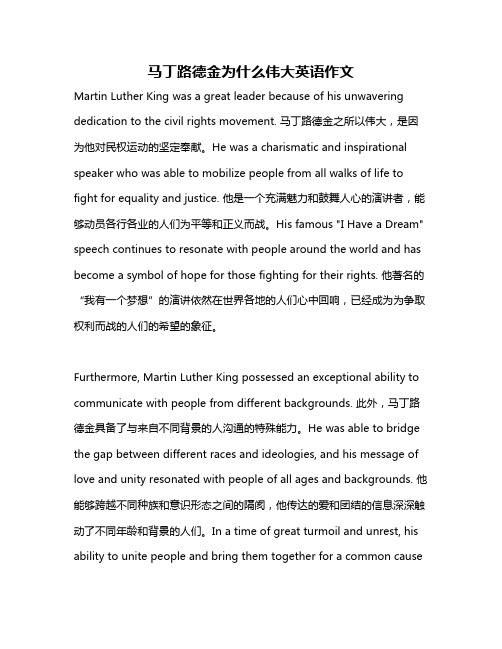
马丁路德金为什么伟大英语作文Martin Luther King was a great leader because of his unwavering dedication to the civil rights movement. 马丁路德金之所以伟大,是因为他对民权运动的坚定奉献。
He was a charismatic and inspirational speaker who was able to mobilize people from all walks of life to fight for equality and justice. 他是一个充满魅力和鼓舞人心的演讲者,能够动员各行各业的人们为平等和正义而战。
His famous "I Have a Dream" speech continues to resonate with people around the world and has become a symbol of hope for those fighting for their rights. 他著名的“我有一个梦想”的演讲依然在世界各地的人们心中回响,已经成为为争取权利而战的人们的希望的象征。
Furthermore, Martin Luther King possessed an exceptional ability to communicate with people from different backgrounds. 此外,马丁路德金具备了与来自不同背景的人沟通的特殊能力。
He was able to bridge the gap between different races and ideologies, and his message of love and unity resonated with people of all ages and backgrounds. 他能够跨越不同种族和意识形态之间的隔阂,他传达的爱和团结的信息深深触动了不同年龄和背景的人们。
- 1、下载文档前请自行甄别文档内容的完整性,平台不提供额外的编辑、内容补充、找答案等附加服务。
- 2、"仅部分预览"的文档,不可在线预览部分如存在完整性等问题,可反馈申请退款(可完整预览的文档不适用该条件!)。
- 3、如文档侵犯您的权益,请联系客服反馈,我们会尽快为您处理(人工客服工作时间:9:00-18:30)。
Martin Luther King was born on January 15, 1929 in Atlanta. His father was the minister, as was his father before him “M. L,”as he was called, lived with his parents, his sister and brother in Atlanta. Their home was not far from the church and father taught their children what would become an important part of
Martin Luther’s life —to treat all people with respect.
Martin’s father worked hard to break down the barriers between the races. His father believed African-Americans should register their complaints by voting.
As M.L. grew up he found that not everyone followed his parents’principles. He noticed that “black”people and white people were treated differently. He saw that he and his white friends could not drink from the same water and could not use the same washrooms.
M.L.’s best friend as a child was a white boy and as children they played happily together. But when they reached school age the friends found that even though they lived in the same community, they could not go to the same school. M.L.’s friend would go to a school for white children only and M.L. was sent to a school for “black”children. After they went to school, they didn’t play together again.
When M.L. was ready for college he decided to follow his father and become a minister. While he at school,
he was inspired by the work of Henry David Thoreau, Civil
Disobedience. It stated that if enough people would follow
their conscience and disobey unjust laws. They could bring
about a peaceful revolution.
Martin Luther King, Jr. would now be addressed as “Dr.
King”. Dr. King took part in the civil rights movement
began with the arrest of Mrs. Rosa Parks, was arrested for
not giving a white bus rider her seat, Mrs. Parks was not the
first African-American to be arrested for this “crime”, but
she was well known in the African-American community.
Dr. King and the other African-American leaders felt
a protest was needed. The African-Americans of the city
were asked to boycott the bus company by walking and
driving instead. The United States Supreme Court would
end the boycott, which lasted 381 days, by declaring that
Alabama’s state and segregation on buses were illegal. The
boycott was a success and Dr. King had showed that
peaceful mass action could bring about change.
In April 1968 Dr. King went to Tennessee to help
the workers who were on strike. On April 3rd Dr. King
would give what would be his last speech: “We’ve got
some difficult days ahead. But it doesn’t matter with me
now. Because I have been to the mountaintop. And I don’t
mind. Like anybody, I would like to live a long life.
Longevity has its place. But I’m not concerned about that
now. I just want to do God’s will. And He’s allowed me to
go up to the mountain. And I’ve looked over. And I’ve seen
the Promised Land. I may not get there with you. But I want
you to know tonight, that we, as a people will get to the
Promised Land. And I’m not fearing any man. My eyes
have seen the glory of the coming of the Lord”.
The following day, April 4, 1968, as he was
leaving hotel. Dr. Martin Luther King was shot and killed.
1929,1,15th, Martin was born in Atlanta
Geogia .
1948, he graduated from Morehouse with a
bachelor degree in sociology.
1951, he graduated with a bachelor of divinity
degree.
1954, he became a pastor.
1955, he graduated with a doctor of Philosophy
degree at Boston Uni.
1963, his efforts led to March on Washington,
where King delivered his “I have a dream”
speech.
1964, he became the youngest person to receive
the Nobel Peace Prize. Then, he refocused his
efforts on ending poverty and stopping the
Vietnam War.
1968,4, King was assassinated in Tennessee.。
